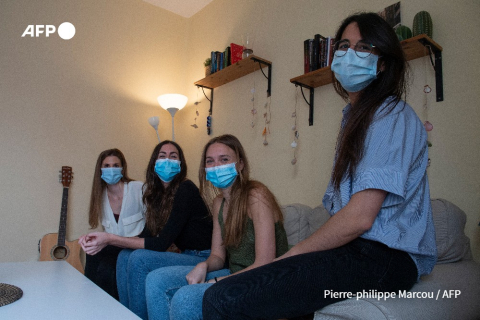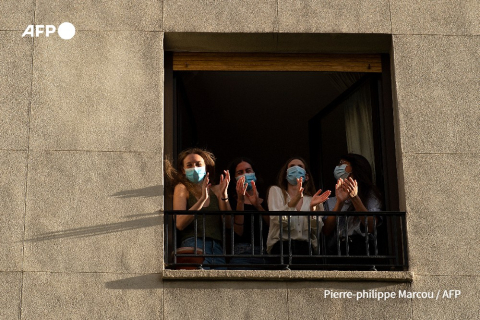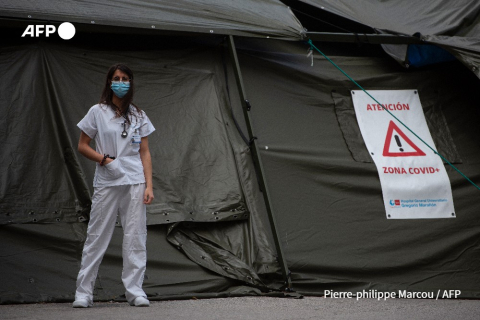Friends fighting Covid-19

By Laurence BOUTREUX
In the spring of 2020, Europe is hit hard by the Covid-19 pandemic: Italy, Spain, France and Britain reel under the first wave of the epidemic.
This AFP report recounts how four young Spanish women doctors cope as they battle the health crisis.
MADRID, May 5, 2020 (AFP) - In their tiny living room, Maria Luisa Prado told her flatmates about a 28-year-old woman "who was also a family doctor like us" who died from coronavirus.
Lourdes Ramos, who shares the Madrid apartment, said she felt "very anxious" at the beginning of the outbreak.
"I got cracks on the skin of my hands from washing them so much," she said.
Two steps from the hospital where they battle the coronavirus outbreak, four young doctors help keep each other calm during the pandemic in one of the world's hardest-hit countries.
About 18 percent of Spain's confirmed cases of the virus have involved healthcare staff, according to health ministry figures.
Prado and Ramos are 29. Their flatmates Ana Rubio and Cristina Rios are a year younger.

When their neighbours go to their windows each night to applaud healthcare workers, they do not realise that the four doctors completing their speciality training are on the frontlines of the virus fight.
The women sometimes work a double shift -- first at a local healthcare centre and then overnight in a hospital emergency ward.
Three of them were about to finish their training and had planned to celebrate with a trip to Vietnam in April.
But on March 3, Spain recorded its first coronavirus death. The toll has since climbed to over 25,000, one of the highest in the world.
'We're not immortal' : Like other Madrid hospitals, the Gregorio Maranon hospital where the four women work quickly became overwhelmed.
"All the halls were full of patients, patients, patients, many waiting for a bed for 48 hours, sleeping in chairs," recalled Rubio.
"There was not enough staff to verify who was okay and who was not. You were left with the fear that someone could die here right now and I won't realise it," she added.
The peak of cases at the hospital came on April 1, with over a thousand patients, including 112 in intensive care, said Rubio.
The four interns, three of them daughters of doctors, say they discovered the weak points of the public health system and their own fragility during the pandemic.
"This experience will help us to grow as doctors and human beings, to value life in another way," said Rubio.
"We're not immortal," she repeated twice.

'Therapy among friends' : The four women are reluctant to talk about the difficult situations they experienced.
But Prado says she is still troubled by the suffering of other colleagues who, when there were no longer any respirators available, had to deny access to the intensive care unit to certain COVID-19 patients.
The four flatmates said they sometimes could not contain their tears, such as when they had to deliver bad news to families.
For Rios the hardest part was telling several people that they could not enter the intensive care unit to say goodbye to a loved one "because they could not expose themselves" to the virus.
All four women were sent to work at a field hospital for less serious coronavirus cases set up at Madrid's main conference centre, which closed on Friday.
They said they enjoyed the sense of camaraderie they found there, and experienced joy at seeing hundreds of grateful patients being discharged after they were cured.
Now they fear a resurgence of the coronavirus which would force the field hospital to reopen.
With their family members far away and boyfriends in lockdown elsewhere, the four women vowed not to let the pandemic dominate their entire lives.
Prado rehearses contemporary dance, Ramos draws, Rubio works out with weights and Rios takes an online guitar course.
They gather in the living room to talk, play cards, swing dance or share meals made by Rubio.
"It's like therapy among friends. Therapy with music, laughter, dance," said Rubio.
